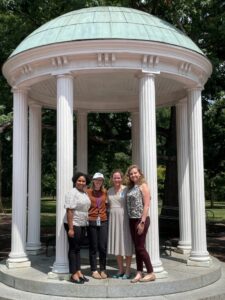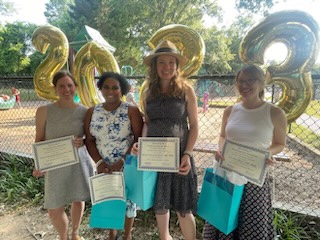Program Overview

Overall Goal
To prepare physicians to become leaders in the fields of hospice and palliative medicine through a one-year ACGME-accredited fellowship emphasizing:
- Diversity of training experiences and patient populations
- Didactic education and faculty mentoring in symptom management, interprofessional team functions and communication skills
- Skills development in teaching and quality improvement necessary for academic and community-based practice careers.
Number of Fellows
4 per year (3 adult, 1 pediatrics track)
Training Sites
- UNC Hospitals and School of Medicine, Chapel Hill, NC
- UNC Hospice
- Transitions LifeCare, Raleigh, NC
- UNC IPU, Pittsboro, NC
Clinical Activities – Adult Fellowship
| Rotation | Weeks |
|---|---|
| UNC Palliative Care Consult Service | 20 |
| UNC Inpatient Hospice | 6 |
| UNC Outpatient Oncology Palliative Care Clinic | 1/2 day a week; minimum 6 months |
| Transitions LifeCare (inpatient hospice, home & long-term care hospice and palliative care) | 8 |
| Radiation Oncology, Anesthesia/Pain, Addiction Medicine | 3 |
| NC Children’s Hospital Supportive Care Team | 2 |
| UNC Consult-Liaison Psychiatry Consultation Service | 2 |
| Elective | 4 |
| Academic Project (Quality Improvement, Education, Research) | 4 |
| Vacation & AAHPM meeting | 4 |
Clinical Activities – Pediatrics Track
| Rotation | Weeks |
|---|---|
| UNC Palliative Care Consult Service | 10 |
| UNC Inpatient Hospice | 4 |
| UNC Children’s Complex Care Clinic 1/2 day a week; minimum | 6 months |
| Transitions LifeCare (inpatient hospice, home & long-term care pediatric and adult hospice and palliative care, Transitions Kids) | 9 |
| Radiation Oncology, Pediatric PM&R | 3 |
| NC Children’s Hospital Supportive Care Team | 16 |
| UNC Adolescent and Young Adult Cancer Program | 2 |
| Elective | 4 |
| Academic Project (Quality Improvement, Education, Research) | Longitudinal |
| Vacation & AAHPM meeting | 4 |
Educational Activities

- One half-day per week is protected for academic activities, including Palliative Care Grand Rounds
- Self-Care and Resiliency Workshop (half-day, monthly)
- Schwartz Rounds – monthly
- American Academy of Hospice and Palliative Medicine (AAHPM) Annual Assembly – the program reimburses conference expenses
Teaching & Academic Activities
- Develop presentations on palliative care topics for health professionals and community audiences with faculty support and supervision.
- Lead evidence-based case discussions and journal clubs.
- Receive education in quality improvement methodology with opportunities to complete a project with faculty mentoring.
- Facilitate workshops on goals of care communication, sharing bad news and giving feedback for medical students and residents with faculty supervision.